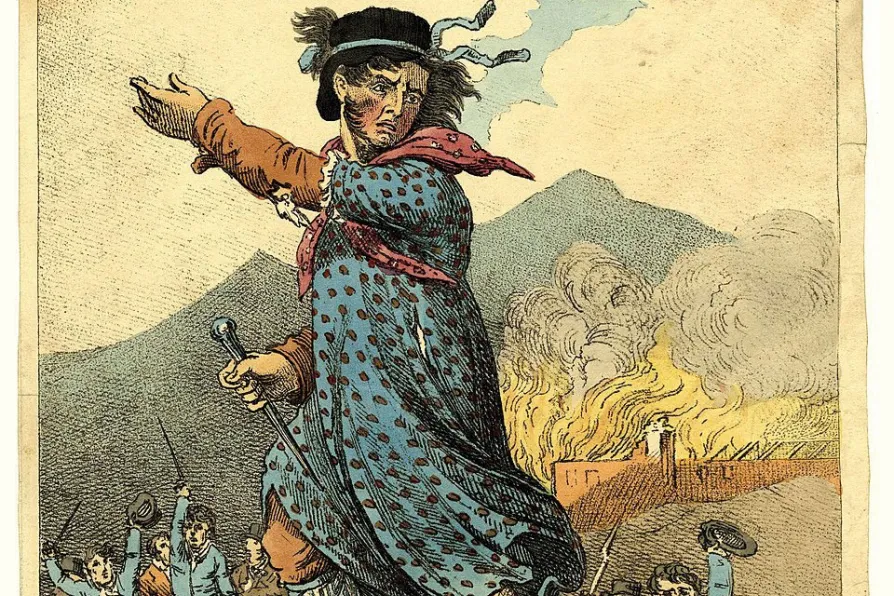John Wojcik pays tribute to a black US activist who spent six decades at the forefront of struggles for voting rights, economic justice and peace – reshaping US politics and inspiring movements worldwide
Inspired by a hit TV show, KEITH FLETT takes a look at the murky history of undercover class war

 ‘ILLEGAL TRADITION’: An engraving entitled ‘The Leader of the Luddites’, 1812
‘ILLEGAL TRADITION’: An engraving entitled ‘The Leader of the Luddites’, 1812
THE recent series of Celebrity Traitors shown on BBC1 attracted 11.1 million viewers for its final episode, an audience record for 2025 and a reminder in current times of what public service broadcasting can do very well.
In the end the Faithfuls were poor at spotting the three Traitors and Traitor comedian Alan Carr ended up winning and making a sizeable donation to charity.
“Traitors” have a wide resonance on the left and labour movement. Indeed it’s there in the words of the Red Flag, “while cowards flinch and traitors sneer.”
There is a similar focus on the political right. John Major labelled Tory Brexiteers “bastards,” and in recent months there has been a sustained hunt for traitors in the Reform-led Kent County Council.
Reform won 58 council seats there in May 2025 but now have 48 councillors, having managed to jettison nine, partly through a leaked video call to the Guardian where some now ex-Reform councillors were found to be rather less than loyal to the leadership.
Historically, however, there has been a strong class content to the term. We might identify three areas. Figures in the ruling class who were held to be traitors to their own side; people, such as police spies, who were in the radical movement but certainly not of it; and employers and those who worked for them who deceived and undermined workers.
Colonel Edward Despard was hung in 1803 after being found guilty of treason. His alleged offence was to be a leader of a conspiracy to assassinate the King. Despard had been involved with the London Corresponding Society and the United Irishmen, but the only evidence at his trial was that of administering illegal oaths.
One person who spoke in court in his defence was Horatio Nelson, who had been on navy ships with Despard. Nelson also tried to get Despard’s death sentence overturned, appealing directly to the King. If the British ruling class thought Despard was a traitor, Nelson clearly did not.
Police spies frequently in the early 19th century were used to infiltrate radical movements and report back to the government. They existed in a murky world where not everyone was as they seemed, ideal for a series of the Traitors.
Perhaps the best known was Oliver the Spy. EP Thompson wrote of the years 1817 to 1820 which included the Pentridge Rising, Peterloo in 1819 and the Cato Street Conspiracy in 1820 there was a “foul pattern of faked evidence, intimidation and double agents.” So much so that Thompson was not politically sympathetic to conspiracy politics argued that if the Cato Street conspirators had succeeded in murdering the Cabinet as they planned there would have been a sort of rough justice. Those involved at Cato Street, off the Edgware Road in central London, had been provoked by repressive government policies and armed by government spies. A traitorous political milieu indeed.
Traitors and class war were a feature of some working-class politics in the early decades of the 19th century. The Luddites were a key part of what is known as the “illegal tradition.” They sought to prevent the introduction of machinery that would destroy jobs. That meant destroying the new machines and on occasion at least threatening to attack the bad masters, traitors, who were introducing them.
This involved meeting in secret and the taking of oaths and the tradition continued into at least the 1830s. The Tolpuddle Martyrs were transported for oath-taking but a separate tradition saw blacklegs and on occasion murdered for being traitors to their class.
A reminder that behind a hit TV show there is historically a murky and sometimes violent history of class war.

It’s not just the Starmer regime: the workers of Britain have always faced legal affronts on their right to assemble and dissent, and the Labour Party especially has meddled with our freedoms from its earliest days, writes KEITH FLETT

While an as-yet-unnamed new left party struggles to be born, MAT COWARD looks at some of the wild and wonderful names of workers’ organisations past that have been lost to time

KEITH FLETT traces how the ‘world’s most successful political party’ has imploded since Thatcher’s fall, from nine leaders in 30 years to losing all 16 English councils, with Reform UK symbolically capturing Peel’s birthplace, Tamworth — but the beast is not dead yet










